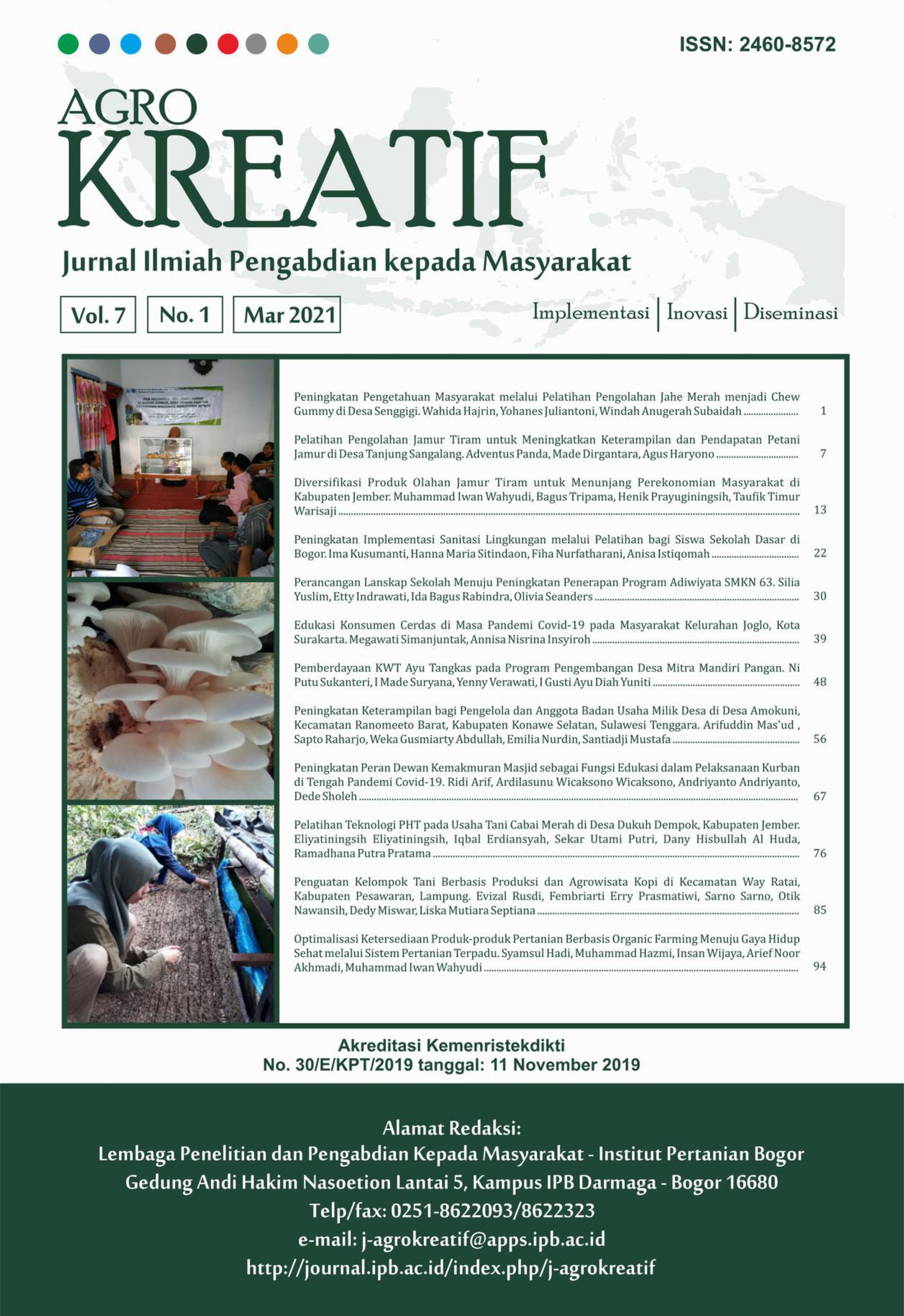Edukasi Konsumen Cerdas di Masa Pandemi Covid-19 pada Masyarakat Kelurahan Joglo, Kota Surakarta
Abstract
Smart consumer education is one of the programs that continuously promote by the government to increase awareness for consumers to be wise and careful in shopping. The education was performed through the WhatsApp group with 60 participants. The implementation of education through the WhatsApp group was chosen due to the PSBB (Large-Scale Social Restrictions) program by the government in suppressing the spread of the Covid-19 virus. This event aims to increase the knowledge of people in Joglo Village, Surakarta City as individuals to become smart consumers who are wise in shopping during the Covid-19 pandemic. The method applied lecture, discussion, and evaluation through pre-test and post-test. The material covered the rights and obligations as consumers, consumer protection agencies, and how to become smart consumers in online and offline shopping during the Covid-19 pandemic. The result shows an increase of knowledge regarding smart consumers, as seen from the pre-test and post-test scores. The implementation of these educational activities encountered several obstacles, such as the limitation of the organizers to ensure that all participants continued to attend the series of events and the organizers could not ensure that all participants filled out the post-test and pre-test.
Downloads
References
[APJII] Asosiasi Penyelenggara Jasa Internet Indonesia. 2018. Hasil Survei Penetrasi dan Perilaku Pengguna Internet Indonesia 2018. [Internet]. [Diakses pada: 5 Agustus 2020] Tersedia pada: https://apjii.or.id/content/read/39/410/Hasil-Survei-Penetrasi-dan-Perilaku-Pengguna-Internet-Indonesia-2018
Arnani M. 2019. Tangani Kasus Kebocoran Data, Lion Air Harus Transparan. Kompas.com. [Internet]. [Diakses pada:] Tersedia pada: https://www.kompas.com/tren/read/2019/09/20/122915365/tangani-kasus-kebocoran-data-lion-air-harus-transparan?page=all
Berg L, Gornitzka A. 2012. The consumer attention deficit syndrome: Consumer choices in complex markets. Acta Sociologica. 55(2): 159‒178. https://doi.org/10.1177/0001699312440711
[BPKN] Badan Perlindungan Konsumen Nasional. 2020. Kinerja BPKN 2017‒2020. Jakarta (ID).
Gazzola P, Colombo G, Pezzetti R, Nicolescu L. 2017. Consumer empowerment in the digital economy: Availing sustainable purchasing decisions. Sustainability (Switzerland). 9(5): 1–19. https://doi.org/10.3390/su9050693
Mahardika WA. 2020. Kebocoran Data, Ingatkan Pentingnya Legislasi RUU. Akurat.co. [Internet]. [Diakses pada:]. Tersedia pada: https://akurat.co/ekonomi/id-1109596-read-kebocoran-data-ingatkan-pentingnya-legislasi-ruu-perlindungan-data-pribadi.
[Pemprov Jateng] Pemerintah Provinsi Jawa Tengah. 2020. Sebaran kasus COVID-19 di Jawa Tengah [Internet]. [Diakses 2 Juli 2020]. Tersedia pada: https://corona.jatengprov.go.id/data
Ruwani A, Retnaningsih, Simanjuntak M. 2014. Nilai dan Tipe Konsumen Rumah Tangga dan Kaitannya dengan Perilaku Pembelian Produk Makanan Kemasan. Jurnal Ilmu Keluarga & Konsumen. 7(1): 48‒57. https://doi.org/10.24156/jikk.2014.7.1.48
Safari A, Simanjuntak M. 2020. Perlindungan Konsumen: Suatu Pengantar. Di dalam: Safari A, Dalimunthe ARL, Anggraini AT, Parman A, Muslim E, Simanjuntak M. Unboxing Perlindungan Konsumen. Bogor (ID): IPB Press. hlm 1‒24.
Simanjuntak M, Mubarokah U. 2020. Investigating how consumer education and lifestyle influence the consumer empowerment: case in rural and urban areas, indonesia. Independent Journal of Management & Production. 12(5): 1232‒1249.
Simanjuntak M, Amanah S, Puspitawati H, Asngari PS. 2014a. Consumer Empowerment Profile in Rural and Urban Area. ASEAN Marketing Journal. 6(1): 38‒49. https://doi.org/10.21002/amj.v6i1.3611
Simanjuntak M, Amanah A, Puspitawati P, Asngari PS. 2014b. Study of consumer education in Bogor, Indonesia. Internasional Asian Journal of Business and Management. 2(5): 481‒490. https://doi.org/10.20885/ejem.vol5.iss2.art4
Simanjuntak M, Amanah S, Puspitawati H, Asngari PS. 2013. Modelling Consumer Empowerment Index. Economic Journal of Emerging Market. 5(2): 109–119. https://doi.org/10.20885/ejem.vol5.iss2.art4
Simanjuntak M, Musyifah I. 2016. Online shopping behavior on generation Y in Indonesia. Global Business Finance Review. 21(1): 33‒45. https://doi.org/10.17549/ gbfr.2016.21.1.33
Simanjuntak M, Hamimi UK. 2019. Penanganan komplain dan komunikasi Word-of-Mouth (WOM). Jurnal Ilmu Keluarga & Konsumen. 12(1): 75‒86. https://doi.org/10.24156/jikk.2019.12.1.75
Simanjuntak M, Putri RRE. 2020. How empowered is the consumer in telecommunications sector: the role of socio-demographic and lifestyle?. Jurnal Manajemen Indonesia. Forthcoming.
Simanjuntak M, Putri SA. 2018. Consumer empowerment index of electronic product buying. Independent Journal of Management & Production. 9(4): 1165‒1183. https://doi.org/10.14807/ijmp.v9i4.814
Simanjuntak M, Umiyati S. 2020. The effect of demographic, social, and economic characteristics on consumer empowerment in education institutions. Independent Journal of Management & Production. Forthcoming. 12(5): 1282‒1299.
Simanjuntak M, Utami FS, Johan IR. 2014. Kerentanan konsumen dan perilaku pembelian produk makanan kemasan. Jurnal Ilmu Keluarga & Konsumen. 8(3): 193‒203. https://doi.org/10.24156/jikk.2015.8.3.193
Simanjuntak M, Yuliati L. 2016. Mapping of Indonesia Consumer Empowerment Index 2016. (Research Report). Bogo (ID): Bogor Agricultural University.
Simanjuntak M. 2016. Does Indonesian consumer empowerment in food aspect contribute to consumer readiness to face Asean Economic Community (AEC)? International Conference on Science, Social Science and Economics Copenhagen, Denmark on October 23rd‒24th, 2016.
Simanjuntak M. 2014. Tingkat keberdayaan dan strategi pemberdayaan konsumen. [Disertasi]. Bogor (ID): Institut Pertanian Bogor.
Simanjuntak M. 2015. Consumer Empowerment Index among Undergraduate Students of Bogor Agricultural University, Indonesia. Asian Journal of Business and Management. 3(3): 183‒191.
Simanjuntak M. 2018. The study of consumers empowerment on food sectors in urban and rural areas of indonesia. World Conference on Business and Management 2018. Jeju Island, Korea Selatan. The People And Global Business Association (P&GBA).
Simanjuntak M. 2019. Generation Y’s complaint behavior toward online shopping. Independent Journal of Management & Production. 10(1): 101‒116. https://doi.org/10.14807/ijmp.v10i1.839
Simanjuntak M. 2019. Indeks Keberdayaan Konsumen: Pengembangan Instrumen dan Pengukuran. Bogor (ID): IPB Press
Simanjuntak M. 2020. Consumer empowerment on online purchasing. Independent Journal of Management & Production. 11(1): 39‒53. https://doi.org/10.14807/ijmp.v11i1.964
Wandani D, Simanjuntak M. 2019. Kepribadian, motivasi, dan perilaku komplain berdasarkan suku. Jurnal Ilmu Keluarga & Konsumen. 12(3): 236‒247. https://doi.org/10.24156/jikk.2019.12.3.236
[YLKI] Yayasan Lembaga Konsumen Indonesia. 2019. Membedah pengaduan konsumen 2019. [Internet]. [Diakses pada: 2 Juli 2020]. Tersedia pada: http://ylki.or.id/2020/01/pengaduan-konsumen-dan-kinerja-ojk/
This work is licensed under a Creative Commons Attribution-NonCommercial 4.0 International License.
10.30656/jsmi.v5i2.2787



















